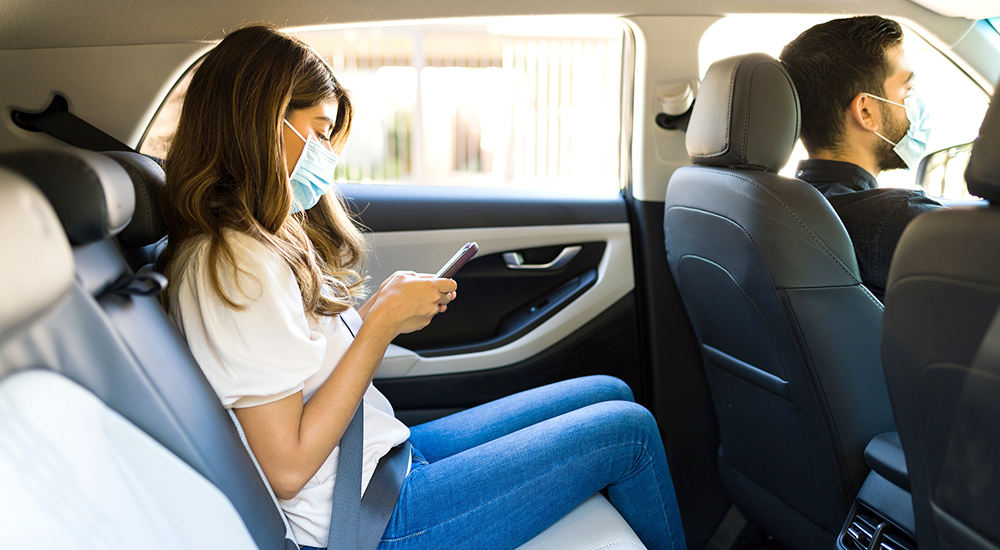Yolanda Peters was hesitant to share her Rideshare story. She grew up traveling the world alongside her father, an American Airman. Inheriting his love of country and service, she enlisted in the Army in 1980. As a light-wheel vehicle mechanic, she became an expert in operating, managing and repairing automotive and heavy equipment in top working condition. The work was tough, but she relished the purpose and community the military provided.
After separating from the Army, Peters moved to California and transferred her talents to the recently established Transportation Security Administration (TSA), where she was one of the earliest employees hired following the attacks on 9/11. Her military training came in handy as she traveled across California, teaching TSA employees across the state’s airports how to use new technology that could detect explosives and weapons.
After the TSA, life brought Peters to Nevada. Although her impressive professional experience generated numerous interview invitations, she realized that transportation would be an issue. The convenience of using the nearby bus stop was contingent upon the bus actually showing up.
In rural areas such as hers, there is often no alternative public transportation infrastructure. Minor delays, driver shortages or unruly weather can easily interrupt or cancel an individual’s journey. Without a reliable ride to work, Peters’ employment faced a perpetual red light.
An Uber-helpful lift
Despite trying to find employment near her apartment, Peters found no positions that could leverage her skillset that were within walking distance from her home. Although she preferred accomplishing tasks on her own, she was willing to work with VA on one thing: a ride to her “graveyard” shift.
Established in 2021 by VA’s Homeless Programs Office, VA’s Rideshare Program has proven to be an essential service to Veterans like Peters. The program began in Boston when VA Innovation Specialist and Army Veteran Charles Franklin brainstormed how to improve Veterans’ access to health care during the pandemic.
Since its inception, Rideshare has been helpful in giving eligible Veterans transportation to and from workplace and health care settings.
For Peters, whose shift begins at 11 p.m., knowing she can call a car that will arrive within minutes when the bus does not is a relief. It also has been essential for maintaining a position she loves: “If not for Rideshare, I would have lost my job.”
A driver of change
Peters hopes her story will encourage other Veterans to use VA programs to travel forward on roads previously blocked. Any doubts Veterans may have about asking for help, Peters said, will be quelled by VA’s caring caseworkers. “They’re great people, and I’m thankful for them.”
From sharing a ride to sharing her story, Yolanda Peters is a true driver of change, fueled by her desire to protect the public. VA is humbled to be along for the ride.
Section 4201(a) of the Johnny Isakson and David P. Roe, M.D. Veterans Health Care and Benefits Improvement Act of 2020 (PL 116-315) authorizes the Secretary of Veterans Affairs to use appropriated funds for life-saving food, shelter, goods and services for homeless Veterans or those participating in U.S. Department of Housing and Urban Development-Veterans Affairs Supportive Housing (HUD-VASH) program during the Coronavirus pandemic public health emergencies.
Eligible Veterans should visit their local VA Medical Center for assistance and to take advantage of the support made possible by this authorization. To find a VA Medical Center near you, visit www.va.gov/find-locations. For immediate assistance, contact the National Call Center for Homeless Veterans at (877) 4AID-VET (877-424-3838).
Topics in this story
More Stories
Study underscores important role COVID vaccination can have in protecting Veterans from infection and reducing long-term health consequences
Columbia VA’s robotic surgery teams completed their 800th robotic surgery and are on schedule to hit 1,000 by the end of the year.
In a decentralized clinical trial, Veterans can participate from their own homes or local VA instead of having to travel to a research site.







Never tell you how to obtain services! Something needs to be done about all the so called benefits advertised with no directions how to get them.
As a former Manager of Ridesharing Services for the State of Maryland, my goal was to persuade commuters to switch from driving to commuting via local buses, long range commuter buses, light rail, metro subway and commuter train service. Homeless veterans would love to have VA ridesharing services available like I managed in the past. Thanks
I have used this program through my Hud-Vash social worker. Did the writer of the first comment notice all of his questions are in fact answered in the article? Eligibility = Homeless veterans…. How to is call the Va and they’ll help out…
This sounds like a great program but this article doesn’t tell us anything about HOW to use it. Other than “Eligible Veterans should visit their local VA Medical Center for assistance” which is something we can’t do if we don’t have a ride . Also no details on who is eligible or how to volunteer to drive if you want to help out other vets. Way to leave us hanging.
I was going to type exactly this but I see y’all beat me to it. I concur!
Who will take me to the VA Hospital next month for my colon exam? No relatives are capable anymore and I outlived all my friends!
Excellent! You help the Vet with what they need. But not making them a”ward” of the VA dependent on ten for everything! This the way to foster dignity and kindness in one event.